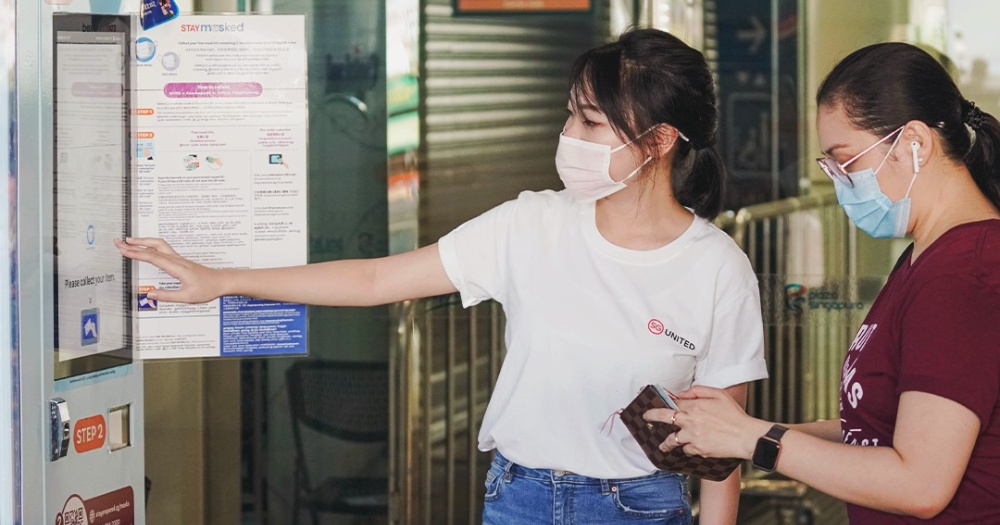On Apr. 14, 2020, a week into the Circuit Breaker, Singaporeans faced a new reality: wearing masks when going out became compulsory.
The new rule came into effect from 7:30pm that day, immediately after the announcement, and penalties were quickly put in place.
During the press conference, reporters asked a pertinent question: when will compulsory mask-wearing end?
In response, health minister Gan Kim Yong said that mask wearing may well continue after the end of circuit breaker.
Fast forward a year, and this is exactly what happened. Wearing masks in public remains compulsory, and for the most part, it has become a part of our daily lives.
Masks didn't appear necessary at first for healthy individuals
The April 2020 announcement was a big deal, as many were initially conflicted on whether they needed to wear face masks in the early days of Covid-19.
Sure, most people understood the necessity of wearing one if they were sick, or had Covid-19 symptoms, but many felt that masks were unnecessary for healthy individuals.
Not everyone thought that way, however.
Some began loading up on available masks in true Singaporean fashion, emptying the stocks of many retailers as early as January 2020, even before the first confirmed Covid-19 case was announced here.
Opportunists, keen to make a quick buck, began to resell masks at ludicrous mark-ups.
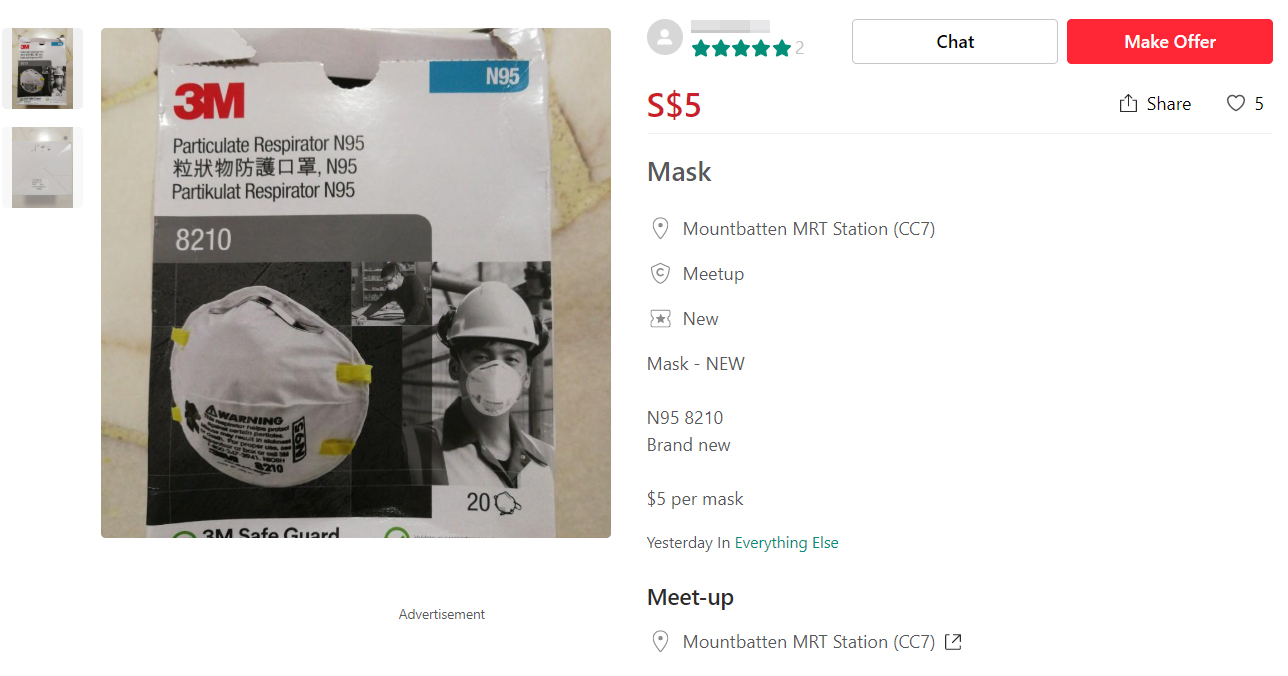 Opportunists were selling individual N95 masks for S$5 each. Image via Carousell.
Opportunists were selling individual N95 masks for S$5 each. Image via Carousell.
In response, the government reminded the public not to panic, and to only wear masks if they were unwell.
Shortly after, the government announced that it would distribute four surgical masks to all households, to alleviate panic-buying.
Even then, the message was clear: only those who display symptoms or were sick should wear the masks.
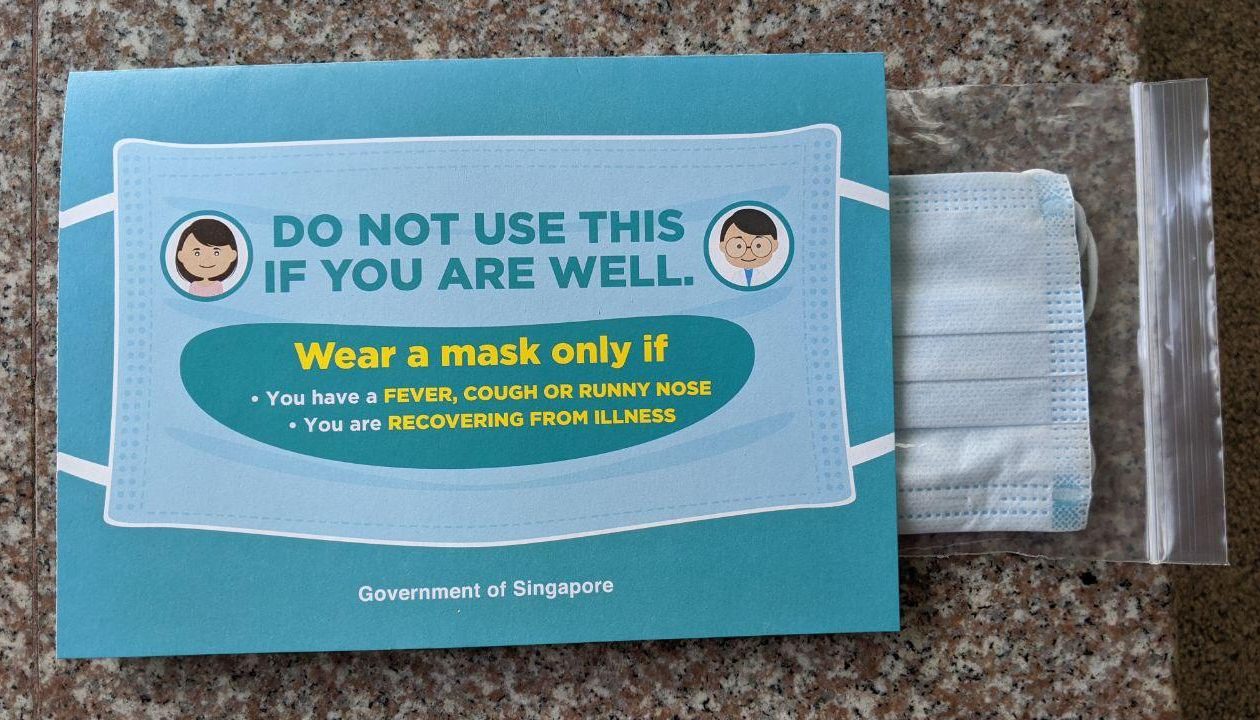 "Do not use this if you are well," said the packaging of masks that were distributed to households from Feb. 2020. Image via Merrill Tang.
"Do not use this if you are well," said the packaging of masks that were distributed to households from Feb. 2020. Image via Merrill Tang.
Apr. 14, 2020: The dawn of masks
By April 2020, the situation had changed.
Amid a sharp rise in Covid-19 cases in Singapore, and with increasing medical literature indicating that wearing masks in public was essential in curbing the spread of the virus, the government said on Apr. 2 that it was reviewing its stance on masks.
On Apr. 3, Prime Minister Lee Hsien Loong addressed the nation, announcing the Circuit Breaker measures, which included shutting down most workplaces and all schools.
PM Lee also said that the government would no longer be discouraging people from wearing masks in public.
Less than two weeks later, mask wearing became a requirement and no longer merely a recommendation, first in selected venues like supermarkets and shopping malls from Apr. 12, and then in all public places from Apr. 14.
With 447 new cases of Covid-19 announced on Apr. 15, a staggering increase over the numbers just two months prior, there was simply no time to lose.
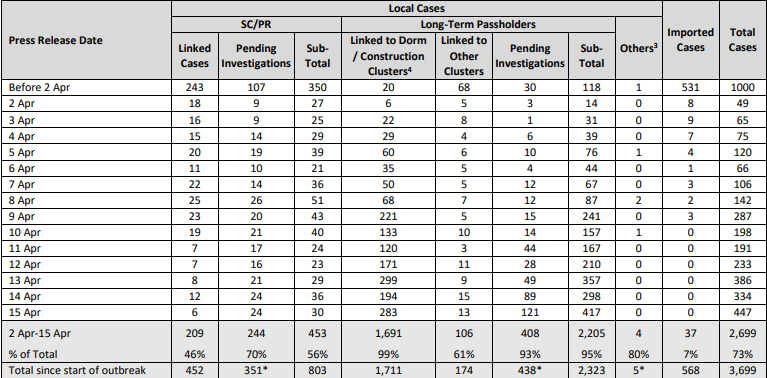 The number of daily cases rose to the hundreds in April 2020. Image via MOH.
The number of daily cases rose to the hundreds in April 2020. Image via MOH.
Not everyone accepted the new rules
While the majority in Singapore understood the necessity of wearing masks to prevent further spread of Covid-19, some who were opposed to the rules.
It didn't take long before these individuals made their views known.
On Apr. 15, a mere day mandatory mask-wearing was enforced, a video of police officers dealing with an unmasked woman in a wet market emerged.
And if you were not living under a rock, you might remember her as the "Sovereign" woman, who declared that rules do not apply to her, because she was a "sovereign".
The case was so high-profile that Minister for Law and Home Affairs K Shanmugam had to weigh in, noting that those who consider themselves a "sovereign", or basically those who feel the law should not apply to them, should not live within society.
This was not the only case. Many people refusing to wear masks continued to make the headlines throughout 2020, with such cases still occurring even in March 2021.
Businesses began coming up with innovative masks
If the headlines were to be taken at face value, it may appear that Singaporeans are highly adverse to wearing masks in public.
Fortunately, these cases appear to be in the minority. After all, if you go outside and look around, you would likely see most people wearing masks with minimal fuss.
While there may have been more resistance initially, mask-wearing has largely become a norm in Singapore.
For many, gone are the days that you walk out of the door, forgetting to wear a mask. It has become second nature now, just like how you don't generally forget to wear shoes when you leave your house.
In fact, face masks are so normalised that many companies began to capitalise on this, by coming up with various modifications to the humble face mask.
Uniqlo launched a quick-drying AIRism mask in August 2020, which was designed to be both comfortable and safe at the same time.
Around the same time, an enterprising company called Pefore launched face masks inspired by the National Day Parade (NDP), despite not being part of the official NDP 2020 merchandise.
And if you want to stop smelling your own breath while wearing your mask, you can always buy a reusable mask that comes with an inner pouch for a fragrance sachet of your choice, in order to make the experience more comfortable.
Perhaps the best way to gauge how prevalent masks have become is to simply look around you.
While many people in early 2020 wore generic disposable face masks, many individuals today wear various custom masks, with a wide variety of colours and designs.
Masks — used primarily to combat Covid-19 — are now also a fashion statement. You can get various accessories like mask pouch or a mask chain. There are even breathing guards that help you breath better when wearing a mask.
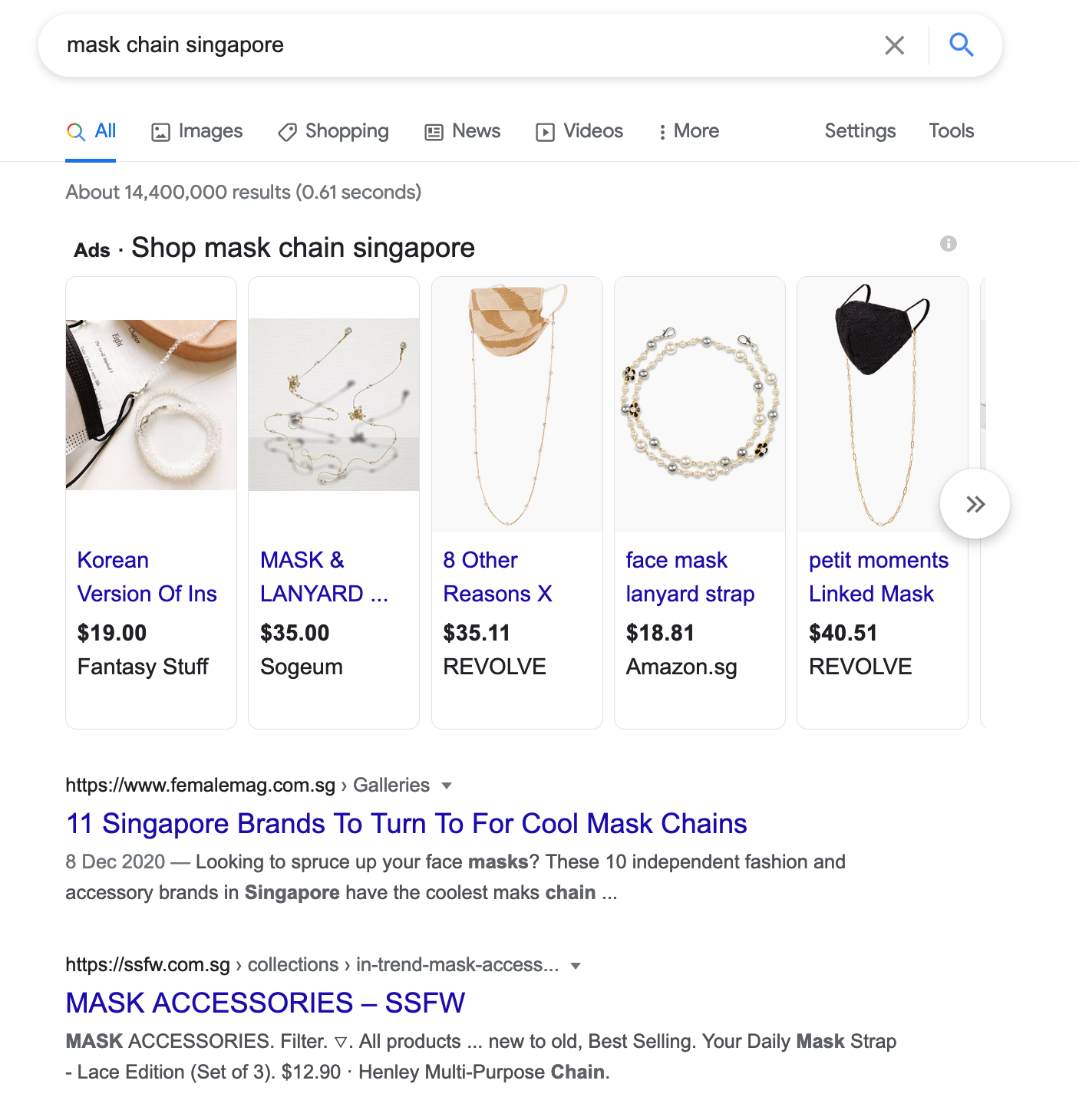 Mask accessories have become quite commonplace. Screeenshot via Google.
Mask accessories have become quite commonplace. Screeenshot via Google.
Mask regulations worldwide are mixed
While wearing masks in public may have become ubiquitous in Singapore, the same cannot be said of the rest of the world.
More than a year after Covid-19 was officially declared a pandemic by WHO, mask regulations are pretty much all over the place globally.
For example, Spain only recently introduced stricter face mask laws, making masks mandatory in public, regardless of the distance between people, in a move that resembles Singapore's own announcement a year ago.
On the other hand, Sweden made headlines earlier this year when officials in Halmstad municipality forced a teacher to remove their mask, and prohibited the use of masks and other protective gear in schools.
While the municipality eventually backed down, similar mask bans kept popping up in Sweden, with many being instructed not to wear masks.
Even within countries itself, mask-wearing can be a divisive issue.
One may need an excel sheet to figure out where you need to wear a mask within the U.S., given how every state has its own set of Covid-19 regulations.
While certain states such as Mississippi has lifted all mask mandates, allowing businesses to operate at full capacity without any additional rules, states such as New York continue to require residents to wear masks in public places, especially when riding public transportation.
On a brighter note, some countries have begun lifting mask restrictions, due to an improvement in their Covid-19 containment efforts.
For example, those in Victoria, Australia no longer need to wear masks in shops, although they are still required to wear them on public transport.
When can we go out without masks?
The golden question remains: when will Singaporeans be allowed to stop wearing masks?
Unfortunately, this is a difficult question to answer.
One way to predict what will happen is to look at what other countries are doing.
For example, Israel currently boasts one of the highest vaccination rates in the world, with more than half its population having received two doses of the Covid-19 vaccine, according to CNN.
The country has implemented a system known as the Green Pass, which is essential for any Israeli to access many popular public places, such as gyms, restaurants, cinemas and sporting venues, among others.
Only those who have either received both doses of a Covid-19 vaccine, or have recovered from a previous infection may apply for the Green Pass.
But in case you think that having a Green Pass in Israel means one can go back to pre-Covid-19 times, you are only partially right.
Although having the Green Pass allows you much more freedom, compared to not having one, face masks remain mandatory.
This means that at least in Israel, being vaccinated does not mean that you'll be free to go to public places without masks, at least in the near future.
Given that the Green Pass is only valid for six months after the individual took their second vaccine dose, it is perhaps indicative that Israel may review its rules on face masks in the future, possibly after more studies have been done on the transmissibility of the virus after vaccination.
Masks are likely here to stay
If we were to simply look at Israel as an example, it may seem unlikely that Singapore will allow the public to stop wearing masks, even after reaching significant vaccination levels.
After all, this is the prudent thing to do, as it is currently too early to tell whether the vaccine will prevent the transmission of the virus.
In simpler terms, we still don't know whether a vaccinated person can still carry and transmit the virus to others, even while they avoid infection themselves.
And even if Singapore drops mask regulations altogether (one can always hope), we'll probably still see masks pretty often.
Face masks may be required when you take a flight, and when you enter other countries, depending on the rules there.
So if you're itching to travel in the near future, it may be best for you to keep your face mask stash ready.
Given how Singaporeans have largely gotten used to wearing masks, it might be surprising to see Singaporeans completely abandon face masks, even after the end of the Covid-19 threat.
After all, the Taiwanese first began wearing face masks during the SARS outbreak in 2003, and even after the threat subsided, face masks were still a common sight in public, for those who are sick, and do not wish to spread their germs to others.
This habit ensured that during the early days of Covid-19, the population was able to wear masks en masse, which was a key reason for the success of Taiwan's Covid-19 efforts.
For the Taiwanese, there was (and still is) little stigma to wearing face masks in public; it was simply the easiest and most practical way to protect oneself in case of a pandemic.
Given that masks may not be going away for some time, it may be better to spend time figuring out which mask designs you like best, rather than anticipate the end of masks, at least in the near future.
Top image via Temasek Foundation/FB..
If you like what you read, follow us on Facebook, Instagram, Twitter and Telegram to get the latest updates.
